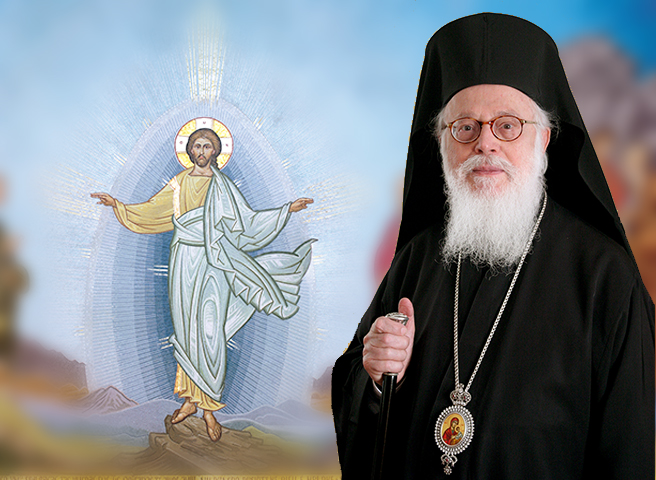The Archbishop of Tirana, Durrës and all of Albania, Anastasi has addressed his message on the occasion of Easter 2021 "Liberation from hatred and its variants".

To the pious clergy and laity.
Beloved in Christ, sons and daughters,
“It is the day of Resurrection
Let us shine brightly for the festival
… Let us even to those who hate us,
forgive everybody for the Resurrection”.
(Doxological hymn of the Matins of Pascha)
Jubilantly, the luminous feast of Pascha calls us to shine brilliantly from joy, being freed from the captivity of the mortifying passions, from every dark element hidden in the depths of our own ego.
The events of the crucifixion of Christ are not only connected with horrible pains, obvious injustices, and fathomless deceit, but primarily with the abyssal hatred of the religious leadership, who stoked a burgeoning hostility within the mob. Regardless, all of this was overthrown by the Resurrection of Christ. Without deafening noise, peacefully.
The Resurrection proclaims a comprehensive victory over death, evil machinations, and the mortifying passions: envy, falsehoods, and especially hatred with its various mutations, resentment, revenge, deceit, which remain resilient in all epochs and in all societies. Hatred infects the life of humankind; in the family, in the religious and political life, in the relations of nations, creating unpredictable conflicts. And today, within the murky atmosphere created by the pandemic, a peculiar hatred often appears in many environments, with various mutations, from the simplest of symptoms –indignation, antipathy, aggressiveness, to the most serious symptoms – polarization, violence, discord.
The effective vaccination to overcome hatred and its various mutations was revealed to us by the crucified and resurrected Christ: it is the voluntary offering of forgiveness. In the short prayer, which He left to His disciples, He placed on the lips of all the members of His Church an agreement “and forgive us our trespasses, as we forgive those who trespass against us” (Mat. 6:12). Emphasizing the grand magnitude and the broadness of love (agape), which He revealed through His teaching and His work, He proclaimed a peaceful revolution. He invited His followers to forgive and to love their enemies “But I say to you, love your enemies… do good to those who hate you” (Mat. 5:44). Even more, through an unexpected warning, He prepared them: “Blessed are you when men hate you… for the Son of Man’s sake” (Luke 6:22). And finally, He sealed this fundamental Christian principle through His final prayer on the Cross: “Father, forgive them, for they know not what they do” (Luke 23:34). Forgiveness, hence-after, has become an essential chromosome of the life of the conscious Christian.
Often many of us try to avoid this basic evangelical principle and command. We insist upon our rights and we call for the maintenance of our dignity and we magnify the danger posed by those who fight against us. Despite this, there is no greater freedom than forgiveness.
However, it is not enough for us to be personally set free from the side effects of hatred. It is imperative for us to contribute continually to the decrease of the tensions around us, to the de-escalation of polarization, of conflicts, and the various mutations of hatred. Blessed are those who achieve, through their word and life, the mitigation of discord, oppositions, and hostilities by cultivating reconciliation. Blessed are those who are inspired by the forgiveness which rose from the grave of Christ. It was Him Who first took the initiative to give his life “as a ransom for many” (Mat. 20:28). For they are indeed shown as “children of the Resurrection”.
“It is the day of the Resurrection. Let us shine brightly” with the paschal light of love, which conquers every form of hate, bestowing upon us spiritual freedom. This hymn repeats the words of Saint Gregory the Theologian, who adds: “even those who hate us, and not only those who because of love have been our beneficiaries or benefactors, let us forgive all in the resurrection” (Oration 1, On Pascha and His Slowness).
And only in this way will we have have the possibility and the right to sing “Christ is Risen!”
Drawing inspiration and power from the resplendent feast of Pascha, the feast par excellence of the cosmic reconciliation, let us attempt to pacify ourselves, by forgiving even those who hate us, regardless of if this seems difficult.
The Resurrection of Christ, proclaiming the victory of life over death and the corrupting passions, invites us to rejoice in our freedom from their tyranny. In a world that is disintegrating from mortifying hostilities and ruthlessness, it calls us to become fighters against hatred and its various mutations; and to fight with firm faith, so that concord may be reinforced, reconciliation, love, unity, the harmonious coexistence of human beings and peoples.
Christ is Risen, my brothers and sisters. May we celebrate this feast with enduring health and hope in this murky period of the pandemic and with the resurrectional freedom in our souls!
With profound love in Christ,
†Anastasios
Archbishop of Tirana, Durres and all Albania